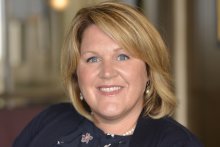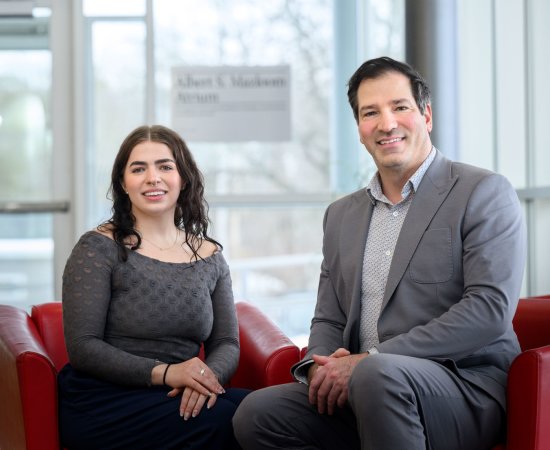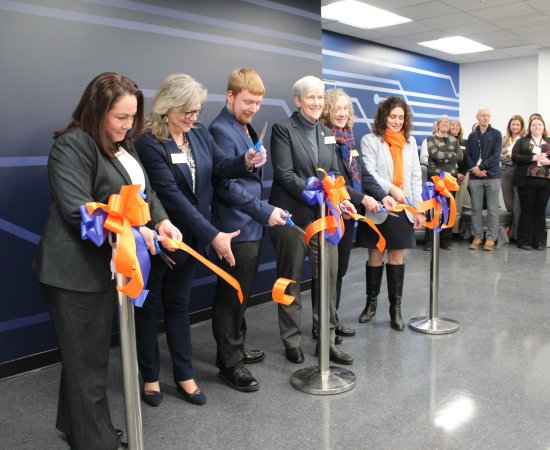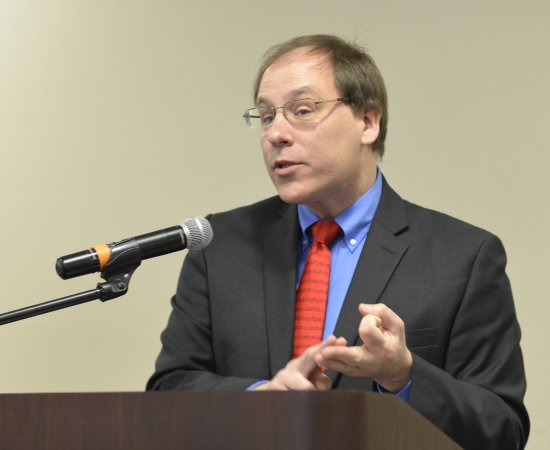
‘Nurses Need Support’ - Professor Jennifer Klimek-Yingling helps others with the emotional challenges of the pandemic

A practicing nurse and UC nursing professor, Jennifer Klimek-Yingling is helping her students—many of them frontline workers—cope with the emotional challenges of the COVID-19 crisis.

Jennifer Klimek-Yingling has worked in healthcare in the Mohawk Valley for years, and continues to practice as an Assistant Professor of Nursing at Utica College. As she moves her practice into the world of telemedicine in response to COVID-19, Klimek-Yingling is also finding ways to support fellow nurses, including her students, during the crisis. "These nurses need emotional support," she says. "And I'm trying to provide that."
UTICA MAGAZINE: Your students are also working nurses on the frontlines of the COVID-19 crisis. How are they holding up?
JENNIFER KLIMEK-YINGLING: We have a large number of students from the downstate region. The pandemic is genuinely impacting our students; they are working in the frontline. They are being affected in so many different ways. We have had students who lost loved ones, coworkers, and friends to COVID. Some have contracted COVID-19 themselves. They talk about the lack of PPE, about being scared they will pass the virus to their families.
UM: It has to be unbelievably difficult for them. As their professor, how are you helping them cope?
JKY: We just had a live session the other night, and we hadn't seen each other in two weeks, and I knew they needed to talk because they just looked mentally exhausted. So I let them speak, and I listened. I am so grateful to have this technology that allows us to be in a virtual classroom, real-time together. There were a couple of students in our live class that got very emotional. These students' lives are turned upside down in so many ways. One told us how they only work with children in the pediatric ICU and because they have so many cases in the adult ICU that they had to be moved there. Some are getting floated every day to different units. Many were talked about the refrigerator trucks containing the deceased. These nurses need emotional support, so I'm trying to provide that.
Sometimes it's about finding little ways to lessen the burden. I try to acknowledge everything they're going through. I have shared my personal fears with them and have let them know that as their nurse colleague I am standing shoulder to shoulder with them as we are challenged with the pandemic. The difference between our students and the traditional college students is that they have all this other stuff going on, including clinical practice and their own families. I have publicly thanked them for the important work they're doing not just in the classroom, but in their communities. I try to make sure they have access to the resources they need—the National Substance Abuse hotline, the domestic abuse hotline, the COVID-19 emotional support line, things like that. I work with a great team of educators. The graduate nursing faculty as a whole has chosen to be transparent, empathetic and are putting grace before grades during the pandemic.
The graduate nursing faculty as a whole has chosen to be transparent and empathetic. We are putting grace before grades during the pandemic.
UM: In what ways has this impacted not just your work life, but your family life, as well?
JKY: Believe it or not, the census significantly dropped so I have been doing virtual ER telework. I never thought about taking care of people virtually [through telemedicine]. It has been a learning curve and is also exciting to see the change in access for patients. I like the safe environment. I was terrified that I would bring the virus home to my family. My kids have been phenomenal in this whole situation. I'm pretty open with them. They understand where I work and the severity of what is going on. With teenagers, it can be hard. They can't see their friends. It is my son's senior year, so he is missing so many things. They're social, so it's been rough.
UM: How have you managed to juggle work and teaching?
JKY: That's just been my life forever. I have to practice to keep my National certification and I believe you have to practice in order to teach nursing effectively. I've had four kids, so life is always busy. I feel like some of the balances I developed take away from my sleep habits. I go to bed pretty late and that started back when my kids were very little because that was the only time where I could focus. I do have a dedicated workspace. I am lucky my kids are used to me doing some form of work from home or virtually, so this hasn't changed with the pandemic. My husband and I have a running expectation at our house that our children excel in their schoolwork, and they have continued to take this seriously. I think that comes partially from watching me go back to school. There were many times we were all at the dining room table doing our work together. I think that was a life lesson for them.
UM: What do you think has been the most challenging aspect of this from a healthcare perspective?
JKY: The hardest thing is the uncertainty. We are uncertain of how this virus is transmitted, how it is treated if we will gain immunity, and when we will develop a vaccine. This uncertainty has led to a lack of guidelines and the changing guidelines. As a health care community, we moved from evidence-based practice to the reality of resource-based practice. That's been a struggle. We have so much to learn about COVID-19
UM: Is there one thing you want your students and the community to know or understand about all this?
JKY: We need to abide by social distancing. Even though it's hard, it is helping. We need to keep washing our hands and keep being kind to people. We need to remember we are in this together.
UM: So, in the middle of something so chaotic, what gives you hope?
JKY: I've seen an incredible amount of kindness. If you can't control the pandemic, you can manage your actions. And I think a lot of people have done that through acts of kindness. I have been blown away by the community support of the first responders and the nursing community. I hope that the silver lining in this pandemic is that this kindness lasts in our communities.
More Stories

The Ideal Co-Author
Grace VanEtten ’26 is handpicked by Professor Christopher A. Riddle to share authorship in prestigious bioethics journal

Utica University Opens New State-of-the-Art Cyber Range
Utica University faculty and students, along with dignitaries and industry partners, marked the opening of the University’s new state-of-the-art Cyber...

Women’s Sports Receive More Primetime Broadcast Olympic Coverage Than Men’s Sports For The Sixth Olympiad In A Row, Seventh Overall
Women’s sports received more coverage than men’s sports during NBC’s primetime television broadcast of the 2026 Milan Cortina Olympic Games,...
I would like to see logins and resources for:
For a general list of frequently used logins, you can also visit our logins page.
